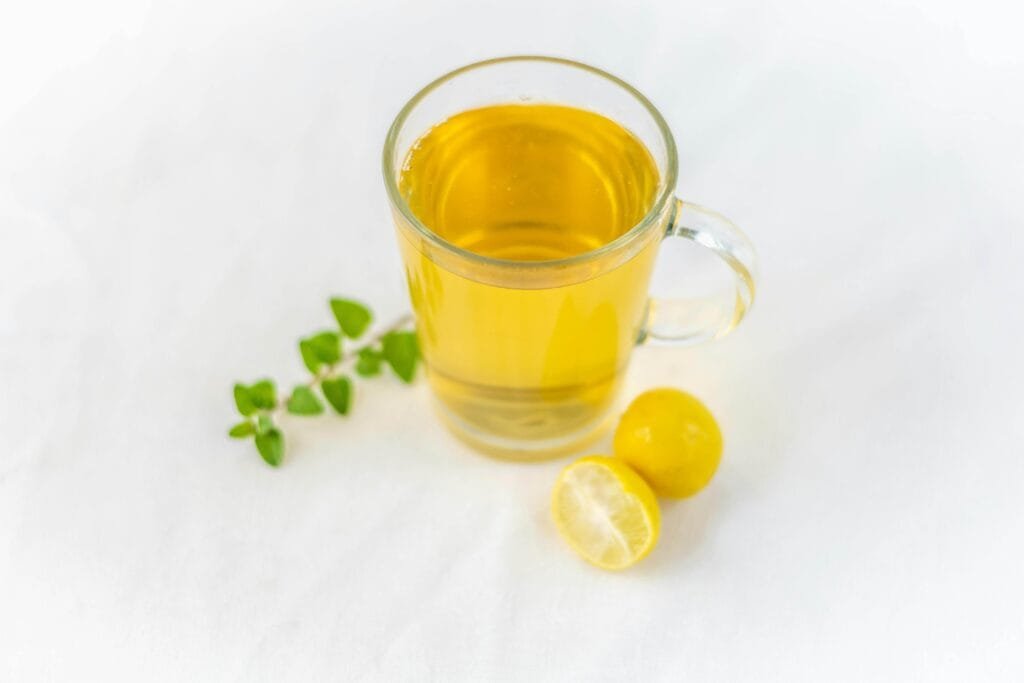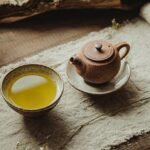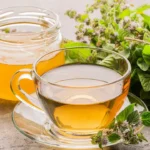Table of Contents
Lemon balm tea, known for its soothing and relaxing properties, has been used for centuries to calm the mind and body. Whether you’re looking to unwind after a stressful day or simply enjoy a flavorful and fragrant herbal tea, lemon balm is a perfect choice. In this guide, we’ll show you how to prepare lemon balm tea in five easy steps, plus we’ll answer some frequently asked questions, like “does lemon balm tea have caffeine?” and provide a simple lemon balm tea recipe you can follow at home.
What Is Lemon Balm?
Lemon balm (Melissa officinalis) is an herb from the mint family, well-known for its calming effects and its light, citrusy flavor. It has been traditionally used to reduce stress, ease anxiety, promote sleep, and even improve digestion. Lemon balm can be enjoyed in various forms, but one of the most popular is tea.
Herbal teas like lemon balm offer a natural and gentle way to enhance well-being. Unlike regular teas made from the Camellia sinensis plant, which contain caffeine, lemon balm tea is 100% caffeine-free, making it ideal for any time of day.
Does Lemon Balm Tea Have Caffeine?
One of the most common questions people ask is, does lemon balm tea have caffeine? The answer is no. Lemon balm tea is completely free of caffeine. Since it’s made from the leaves of the lemon balm herb rather than from the tea plant, it’s classified as a herbal tea. This means you can drink it late in the day without worrying about disrupting your sleep or experiencing the jitters associated with caffeinated drinks.
For those who are sensitive to caffeine or want to cut back on their caffeine intake, lemon balm tea is a great alternative. Its natural calming properties can even help you fall asleep faster, making it an excellent choice for an evening beverage.

Health Benefits of Lemon Balm Tea
Lemon balm tea isn’t just delicious; it also boasts a wide range of health benefits. Here are some reasons why adding lemon balm tea to your daily routine might be a great idea:
1. Reduces Stress and Anxiety
Lemon balm is most famous for its calming properties. Drinking lemon balm tea can help reduce feelings of stress and anxiety, making it a perfect choice if you need to relax after a long day.
2. Promotes Better Sleep
As a natural sedative, lemon balm tea can help improve the quality of your sleep. Many people use it as a sleep aid to help them fall asleep more easily and enjoy a deeper rest. Since it’s caffeine-free, it’s a perfect drink to enjoy before bed.
3. Improves Digestion
If you’re dealing with bloating or indigestion, lemon balm tea can soothe the stomach and help alleviate discomfort. Its antispasmodic properties can also relieve cramps and ease nausea.
4. Boosts Cognitive Function
Some studies suggest that lemon balm may enhance memory and cognitive function. While more research is needed, many people drink lemon balm tea to help improve focus and concentration.
5. Supports Immune Health
Lemon balm contains antioxidants that may help support the immune system and protect your body against free radical damage.
Now that you know why you should consider drinking lemon balm tea, let’s move on to the fun part—how to make it!
How to Prepare Lemon Balm Tea: Step-by-Step Guide
Ingredients You’ll Need:
- Fresh or dried lemon balm leaves
- Hot water
- Optional: honey, lemon slices, or mint for added flavor
Instructions:
Step 1: Harvest or Buy Lemon Balm Leaves
If you grow lemon balm in your garden, pick a handful of fresh leaves. If not, you can easily find dried lemon balm leaves at most health food stores or order them online.
Step 2: Rinse the Leaves (If Using Fresh Lemon Balm)
If you’re using fresh leaves, be sure to rinse them thoroughly under cold water to remove any dirt or debris.
Step 3: Boil the Water
Heat water in a kettle or saucepan until it reaches a rolling boil. The water should be about 90-95°C (194-203°F) for the best infusion.
Step 4: Steep the Lemon Balm Leaves
Place the fresh or dried lemon balm leaves into a teapot or directly into your cup. For each cup of tea, use about 1 tablespoon of dried leaves or 2 tablespoons of fresh leaves. Pour the boiling water over the leaves and cover. Let the tea steep for 5-10 minutes, depending on how strong you like it.
Step 5: Strain and Serve
Once the tea has finished steeping, strain out the leaves and pour the tea into your cup. You can enjoy it as-is, or add a drizzle of honey or a slice of lemon for extra flavor.
Bonus Tip:
For a refreshing summer twist, you can prepare lemon balm iced tea by brewing the tea as usual, letting it cool, and then pouring it over ice. You can also experiment by mixing lemon balm tea with other herbal teas like chamomile or mint for a more complex flavor.
Simple Lemon Balm Tea Recipe

Here’s a quick and easy lemon balm tea recipe that you can follow:
Ingredients:
- 2 tablespoons of fresh lemon balm leaves (or 1 tablespoon of dried leaves)
- 1 cup boiling water
- Honey or lemon (optional)
Directions:
- Place the lemon balm leaves in a teapot or cup.
- Pour the boiling water over the leaves.
- Cover and steep for 5-10 minutes.
- Strain the leaves and sweeten with honey or add lemon if desired.
- Serve and enjoy!
This lemon balm tea recipe is simple, but it offers endless possibilities for customization. Try adding mint for a cooling effect or ginger for a spicy kick.
How Often Can You Drink Lemon Balm Tea?
Since lemon balm tea is caffeine-free and gentle on the system, you can enjoy it throughout the day. Many people drink it multiple times a day, especially in the evening, to relax and unwind. However, as with any herbal remedy, it’s a good idea to start with a moderate amount and see how your body responds.
If you’re using lemon balm tea to improve sleep, drinking a cup about 30 minutes before bedtime can help you drift off naturally.
Side Effects and Precautions
While lemon balm tea is generally safe for most people, it’s important to keep a few things in mind:
- If you’re pregnant or breastfeeding, consult your doctor before consuming lemon balm tea.
- Some people may experience mild side effects like nausea or dizziness when consuming lemon balm in large amounts.
- If you have a thyroid condition, speak with your healthcare provider, as lemon balm may interfere with thyroid function.
Final Thoughts
Learning how to prepare lemon balm tea is not only easy but also opens the door to enjoying a host of health benefits. This caffeine-free, delicious herbal tea can help calm your mind, improve your digestion, and even enhance your sleep quality. By following the simple lemon balm tea recipe shared above, you can enjoy this soothing beverage any time of day.
So, brew yourself a cup, take a deep breath, and relax with the gentle, calming embrace of lemon balm tea.












